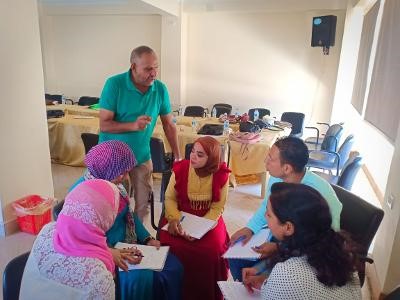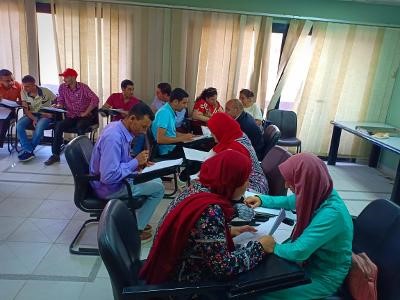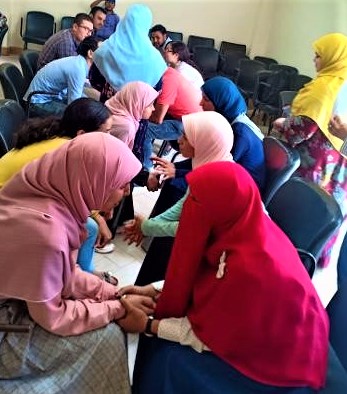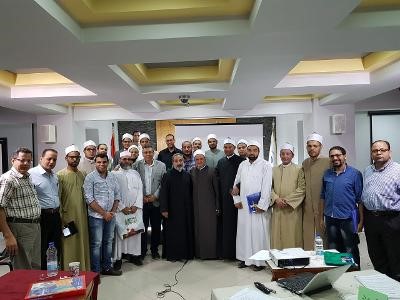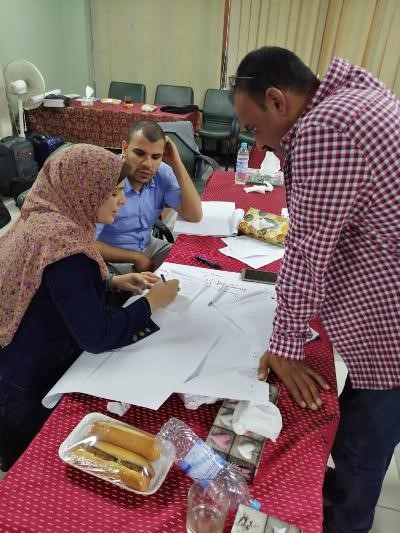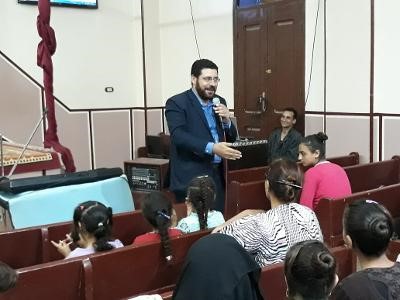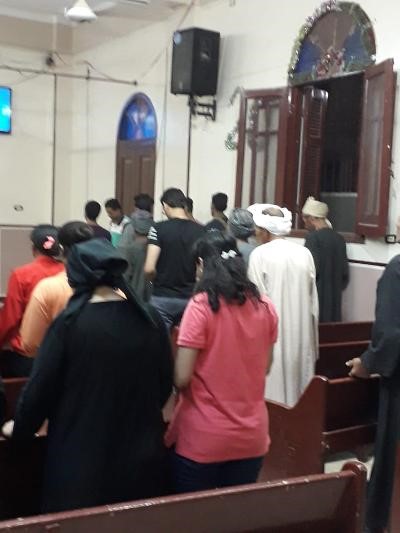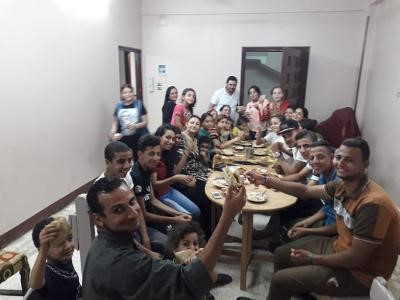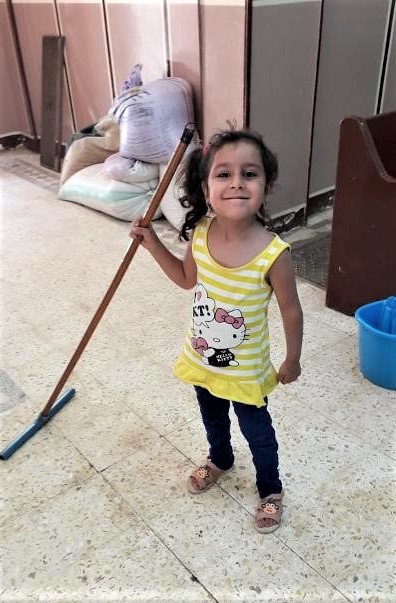A Letter from Noah Park and Esther Shin, serving in Egypt
September 2019
Write to Noah Park
Write to Esther Shin
Individuals: Give online to E200536 for Noah Park and Esther Shin’s sending and support
Congregations: Give to D507591 for Noah and Esther’s sending and support
Churches are asked to send donations through your congregation’s normal receiving site (this is usually your presbytery).
The Summer for ETSC (Evangelical Theological Seminary in Cairo) was busy and fruitful, with many different educational programs for Evangelical (Presbyterian) churches and society. Since evangelism, or Christian gatherings, is not allowed outside the church buildings in Egypt, our seminary works as the hub of Christian ministry in Egypt. Throughout the summer, intensive courses for church leaders were offered in June and elders’ continuing education in July, with 47 male elders and three women lay leaders graduating from this program. MDiv students did summer internship ministries for nine weeks in different places. Our student interns expanded their training while they met needs in churches and other ministry situations. Some students have even planted churches while serving their internships. Students have worked in orphanages, prisons, cancer hospitals, addict rehabilitation centers, or among refugees in Egypt, Syria or Turkey. These ministry settings challenge our students to adapt their academic training to a wider audience.
Peter, a second-year student of the MDiv program, says, “One of the special things about studying at ETSC is the practical summer training. This summer learning experience broadens my perspective on others and church, and my vision for future ministry.” This summer he has learned from the Coptic Evangelical Commission of Social Services (CEOSS), which is involved in social development programs such as health awareness, follow-up for pregnant women, ‘working children’ and child rights laws, farmers’ awareness of inexpensive and beneficial methods of planting and farming, and rehabilitating people with special needs. Peter also participated in Hewar, which means ‘dialogue’ or ‘conversation’ in Arabic. This is a cultural dialogue program with different religious leaders of Islam, the Coptic Church, and the Evangelical (Presbyterian) Church and with students of different religious colleges. He said, “The biggest effects of this training were self-knowledge and knowledge of the other.” Peter says, “Al-Azhar sheikhs, Muslim religious leaders, Coptic priests, and Protestant pastors—we all face the same challenge of the wave of atheism, which puts the cleric within a certain framework where he or she is expected to solve every problem of life.” Peter heard from a student from Al-Azhar sheikhs about the same fear of his philosophical ideas that would be contrary to his religion, and the same frustration of not knowing how to communicate with different religious leaders. Peter says, “This training made me feel responsible for cultivating a spirit of coexistence through continuous communication between the church which I will serve and mosques and Coptic churches in the same geographical area.”
Not only did this summer ministry provide a vital training experience for students, but it also filled a great need in the churches and in society. With the growth of the Evangelical Churches in Egypt, the Synod of the Nile has developed 110 new churches, and our third-year students and recent graduates are fulfilling a vital need in these new congregations.
Asaad, a third-year MDiv student, has ministered in the Evangelical Church of Toukh in the village of Mallawi in Upper Egypt. The church had not had its own pastor until Asaad began his summer ministry. A former high school French teacher, he has focused especially on building strong relationships with young leaders and servants in the church and developing church leaders and Sunday School leaders. He has provided support, guidance, and training for them. He also provided ‘spiritual days’ for the church to grow spiritually. During two “spiritual day” events, one in June and the other in August, he helped the congregation to grow spiritually and fellowship together. His wife, a high school English teacher, and his two daughters, have also joined his first church ministry. Asaad has also established a strong relationship with the people of the Evangelical church in Toukh as well as with the people of the Orthodox Church in general. He visits people in their homes, has built a bridge of trust, intimacy, and affection, and has introduced the Gospel to nominal Christians.After their summer internship, our students will spend three weeks with their families, and come back to the seminary for a new academic year with the many questions and challenges that will have come up in their summer ministries. ETSC tries to provide students with an open space to ask questions, find their true identity as Christian leaders, and seek their calling to Christian ministry in a majority Muslim society.
Peter says that his learning experience at ETSC is new, challenging and transformative. We are proud to do this important teaching ministry at ETSC, fueled by your continuing prayers and support. As we begin our new semester, please remember our students, teachers and staff in your prayers, that we might humbly follow God’s vision and bring about God’s Kingdom in our midst.
Thank you again for walking this journey with us!
May God bless and give you peace in every moment of your life and ministry!
In Christ, with Christ, and for Christ,
Noah and Esther
Please read this important message from Sara Lisherness, interim director of Presbyterian World Mission
Dear friend of Presbyterian Mission,
Greetings in Christ! As the interim director of Presbyterian World Mission, I am grateful to have the opportunity to thank you for your continued support of PC(USA) mission co-workers.
The enclosed newsletter bears witness to some of the many ways in which God is at work in the world through long-standing relationships between global partners and the PC(USA). These partnerships are nurtured and strengthened by the presence of mission co-workers in over 40 countries; you are an important part of this partnership too, as you learn about and share how our church is involved in global ministry; as you pray for our partners and mission co-workers; and as you take action to work with others for God’s justice, peace and healing.
I write to invite you to continue joining us in partnership in three ways. First, your prayers are always needed. Please pray that God will continue guiding the shared work of the PC(USA) and global partners as we engage together in service around the world. Pray, too, for mission co-workers, that they may feel encouraged in the work they are doing under the leadership of global partners.
Second, please consider making a year-end gift for the sending and support of at least one mission co-worker. There is a remittance form at the end of this letter and an enclosed envelope so that you can send in a special year-end gift.
Finally, I encourage you to ask your session to include one or more mission co-workers in your congregation’s mission budget for 2020 and beyond. PC(USA) mission co-workers’ sending and support costs are funded by the designated gifts of individuals and congregations like yours; your gifts allow Presbyterian World Mission to fulfill global partners’ requests for mission personnel.
Faithfully in Christ,
Sara Pottschmidt Lisherness
Director, Compassion, Peace and Justice Ministry
Interim Director, Presbyterian World Mission
![]() You may freely reuse and distribute this article in its entirety for non-commercial purposes in any medium. Please include author attribution, photography credits, and a link to the original article. This work is licensed under a Creative Commons Attribution-NonCommercial-NoDeratives 4.0 International License.
You may freely reuse and distribute this article in its entirety for non-commercial purposes in any medium. Please include author attribution, photography credits, and a link to the original article. This work is licensed under a Creative Commons Attribution-NonCommercial-NoDeratives 4.0 International License.
